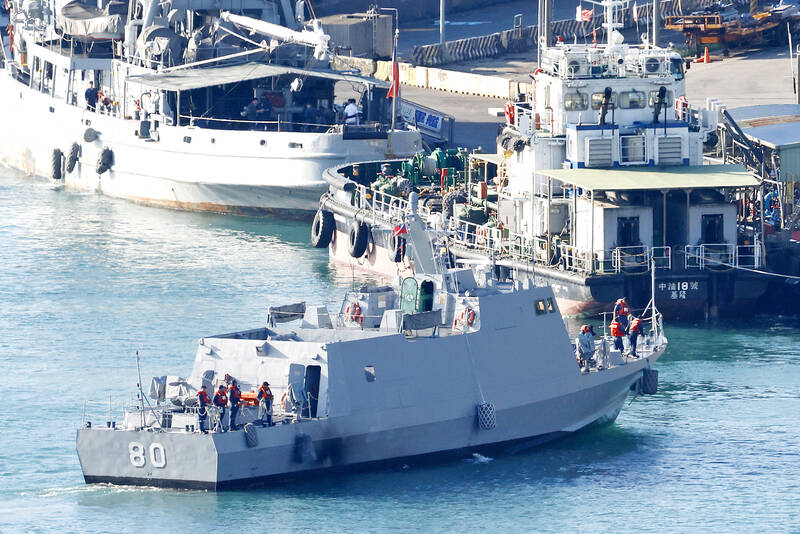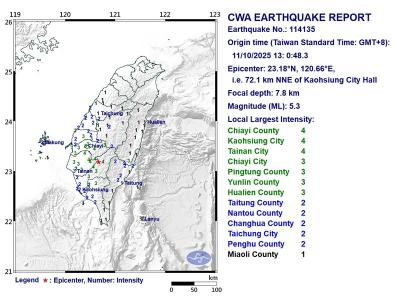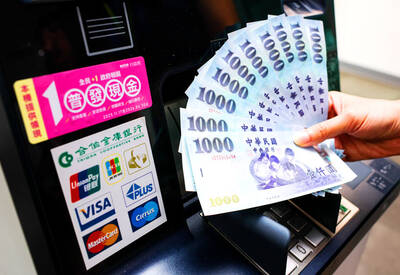Disruptions to trade in the Taiwan Strait, where in 2022 approximately US$2.45 trillion of goods — over one-fifth of global maritime trade — transited, would send shock waves well beyond Taiwan and China, a US-based think tank said in a report published just days before Chinese military drills around Taiwan.
The Center for Strategic and International Studies (CSIS) on Thursday published on its Web site a report titled “Crossroads of Commerce: How the Taiwan Strait Propels the Global Economy.”
China’s rising assertiveness has sparked fears that it might soon attempt to use force to bring Taiwan under its control, but Beijing has a range of options short of an invasion at its disposal, the report said.

Photo: Ritchie B. Tongo, EPA-EFE
CSIS research suggested that less kinetic actions, such as a coast guard-led quarantine of Taiwan, are more likely in the short term, and such lower-intensity contingencies could still threaten the trillions of dollars of trade that moves through the Taiwan Strait each year, it said.
Yesterday, the Chinese People’s Liberation Army announced the start of its “Joint Sword-2024B” drills around Taiwan.
More than 90 percent of cutting-edge chips are produced in Taiwan, while Taiwan’s ports in 2022 handled trade worth an estimated US$586 billion, the report said.
Any disruption of commercial traffic through the Strait might prompt shipping companies to stay out of the area to limit risks and avoid paying spiked insurance premiums, it said.
However, forced deviations from well-worn routes come at a cost, including longer journeys and delays that ultimately affect consumers, it said.
Two key US allies, Japan and South Korea, would be among those most affected by disruptions, it said.
Thirty-two percent of Japan’s imports and 25 percent of its exports — totaling nearly US$444 billion — transited the Strait in 2022, and South Korea depended on the waterway for 30 percent of its imports and 23 percent of its exports, amounting to about US$357 billion in goods, the report said.
Both countries rely on the Strait for importing raw materials to meet their immense energy needs, with more than 95 percent of Japan’s and 65 percent of South Korea’s crude oil sourced from a select group of Middle Eastern countries, of which much of the trade passes through the Strait, it said.
As for the effects on other Indo-Pacific countries, nearly 27 percent of Australia’s exports passed through the Taiwan Strait in 2022, totaling almost US$109 billion, it said, adding that the Philippines, Vietnam, Thailand, Laos and Myanmar are less dependent on the waterway.
Moreover, “the Taiwan Strait’s importance is not limited to Indo-Pacific countries,” the report said, adding that the four countries most reliant on the Strait are in Africa.
The Democratic Republic of the Congo shipped nearly US$13 billion of metals — 62 percent of its total global exports — through the Strait, Eritrea used it to export more than 70 percent of its zinc and copper ores to China, and Gabon and Angola shipped about 40 percent of their oil to China through the passage, it said.
Countries in the Middle East are similarly reliant on the Taiwan Strait for transporting oil to Asian markets, with Oman, Saudi Arabia, Iraq, Kuwait, Qatar and Yemen sending more than 30 percent of their exports through it, the report said.
“On average, the nine BRICS economies rely on the Taiwan Strait for about 14 percent of their imports and 15 percent of their exports. That is more than twice the level of dependence of the G7 economies,” it said.
Positioning itself as a leader and voice of developing countries, Beijing’s need to maintain diplomatic support from these nations to advance its vision — an international order beyond the “Western approach” — might make it more sensitive to their concerns, it said.
“Faced with severe disruptions to their trade, they [the developing countries] could collectively exert significant pressure on Beijing to resolve a conflict to avoid long-term economic pain,” it said.
“Ensuring free and open maritime trade through the Taiwan Strait is critical not just for nearby nations like China, South Korea and Japan, but for the entire global economy,” the report said. “For Washington, working closely with allies and partners to maintain cross-strait stability is essential to safeguarding international trade.”

The Central Weather Administration (CWA) today issued a sea warning for Typhoon Fung-wong effective from 5:30pm, while local governments canceled school and work for tomorrow. A land warning is expected to be issued tomorrow morning before it is expected to make landfall on Wednesday, the agency said. Taoyuan, and well as Yilan, Hualien and Penghu counties canceled work and school for tomorrow, as well as mountainous district of Taipei and New Taipei City. For updated information on closures, please visit the Directorate-General of Personnel Administration Web site. As of 5pm today, Fung-wong was about 490km south-southwest of Oluanpi (鵝鑾鼻), Taiwan's southernmost point.

Almost a quarter of volunteer soldiers who signed up from 2021 to last year have sought early discharge, the Legislative Yuan’s Budget Center said in a report. The report said that 12,884 of 52,674 people who volunteered in the period had sought an early exit from the military, returning NT$895.96 million (US$28.86 million) to the government. In 2021, there was a 105.34 percent rise in the volunteer recruitment rate, but the number has steadily declined since then, missing recruitment targets, the Chinese-language United Daily News said, citing the report. In 2021, only 521 volunteers dropped out of the military, the report said, citing

A magnitude 5.3 earthquake struck Kaohsiung at 1pm today, the Central Weather Administration said. The epicenter was in Jiasian District (甲仙), 72.1km north-northeast of Kaohsiung City Hall, at a depth of 7.8km, agency data showed. There were no immediate reports of damage. The earthquake's intensity, which gauges the actual effects of a temblor, was highest in Kaohsiung and Tainan, where it measured a 4 on Taiwan's seven-tier intensity scale. It also measured a 3 in parts of Chiayi City, as well as Pingtung, Yunlin and Hualien counties, data showed.

Nearly 5 million people have signed up to receive the government’s NT$10,000 (US$322) universal cash handout since registration opened on Wednesday last week, with deposits expected to begin tomorrow, the Ministry of Finance said yesterday. After a staggered sign-up last week — based on the final digit of the applicant’s national ID or Alien Resident Certificate number — online registration is open to all eligible Taiwanese nationals, foreign permanent residents and spouses of Taiwanese nationals. Banks are expected to start issuing deposits from 6pm today, the ministry said. Those who completed registration by yesterday are expected to receive their NT$10,000 tomorrow, National Treasury